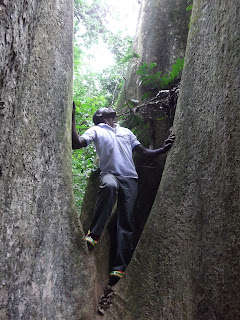On
Wednesday and Thursday I returned to the Legal Aid Board (LAB). The
mornings of both were spent mainly in the District and Juvenile Courts, which furnished a striking contrast to the
Supreme Court. The building that housed the courts was, unsurprisingly,
much more modest: simply four courtrooms in a row, all opening onto a long
verandah which ran the length of the building. The waiting area was a
raised platform with a roof situated outside the court building.


I
was also taken to see the police unit on site.
It was a few moments before I noticed that two men were imprisoned in a
cell in the corner – for not paying maintenance, I was informed. The cell was extremely basic, being simply a
small room with a barred door opening onto the main police office, so I was relieved
to hear that they would be there only temporarily. However, when later on I asked some questions
about prison standards in Ghana, I was told that in permanent prisons there
would be many prisoners in a cell of the same size, with few or no more facilities. Overcrowding is apparently a significant problem,
one which stems partly from the fact that, other than fines, there are no other
punitive options available to the courts: community orders, for example, do not
exist.
The
District Courts deal with all manner of cases – in the short time I was there, I saw cases involving questions of debt, landlord and tenant relations, intestacy,
property, and family disputes. There was
much to admire in the way this diverse caseload was handled by the judge, often
without the benefit of lawyers (indeed, the number of litigants representing
themselves goes some way towards answering the questions raised in my previous
blog post about the apparent absence of demand for legal services). Although much of what occurred would probably
constitute an “irregularity” – and a ground for appeal – in the UK, here it seemed a commonsense reaction to circumstances. For example, at the end of one case, a rather
sad dispute between sons and their father, the judge delivered what can only be
described as a homily, urging the parties to get along. It clearly came from the heart, and was quite
personal - and deeply religious - in tone.
For someone accustomed to the careful formality of the UK courts, it was
startling, but somehow refreshing.
What appeared to me to be the biggest problem facing these
courts was absenteeism. This was
especially obvious on the Thursday morning.
In the first case I observed, it was the witness who was due for cross-examination
who wasn’t there; in the third case, it was the defendant; and in the fifth
case, it was the defendant’s lawyer.
This is perhaps the other side of the coin of the more relaxed approach
described above. I also wondered whether
the problem was exacerbated by the fact that, in Ghana, the practice for
calling witnesses is for each witness to be given a specific time to appear. In the UK, in contrast, all witnesses are asked to come along at the beginning, and then wait their turn. This latter approach does of course waste much
time of many witnesses – but with the former approach, it is the court’s time
that is wasted when the appointed witness is absent and there is nothing to do
but adjourn.
On both days, I was very kindly treated to a local lunch by
Abu Issah, the LAB’s lawyer. On
Wednesday we had chicken and rice at the National Theatre, and on Thursday we
had kenkey, which is a sort of dumpling made of ground maize wrapped in a corn
husk. Sadly this last didn’t agree with
me (to the extent that there won’t be a blog post on Day 9, as I spent most of it
in the local clinic on a drip...).
The afternoon of both Wednesday and Thursday were spent at
the LAB’s office. On the Wednesday, I
observed another mediation – in which, rather to my alarm, I was introduced as “co-mediator”. I felt it was probably best to keep my co-mediating
to a minimum, never having attempted it before.
On the Thursday, I sat with Abu watching him deal with a dizzying
succession of clients. As with the
District Courts, he was presented with a diverse range of problems and I was impressed
by the ease with which he moved between cases on land, crime, family, and the
armed services.
I very much enjoyed my time at the Legal Aid Board, and am
particularly grateful to Abu for taking such trouble to show me all the
different aspects of his work.
 |
| Me with Abu Issah, the LAB lawyer. |
































